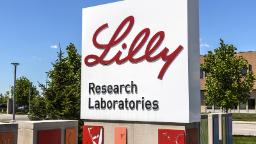
CNN
—
The US Food and Drug Administration declined to grant accelerated approval to an experimental Alzheimer’s drug, donanemab, and requested additional data from Eli Lilly and Company, the drug maker.
The company, which announced the development on Thursday, plans to file Phase 3 clinical trial data later this year for a traditional FDA approval.
The findings in a previous Phase 2 trial, published in May in the New England Journal of Medicine, suggested that treatment with donanemab could lead to “modestly less cognitive and functional decline” in patients with early Alzheimer’s disease, but the drug was associated with some adverse events, such as cerebral swelling or effusions, which were mostly asymptomatic.
In that trial, the researchers looked at the drug’s impact on the buildup of amyloid beta plaque and tau proteins, which are considered hallmarks of Alzheimer’s disease.
“We look forward to our upcoming confirmatory TRAILBLAZER-ALZ 2 Phase 3 results and subsequent FDA submission, which we’ve always seen as the most impactful next steps for patients,” Anne White, executive vice president and president of Lilly Neuroscience at Eli Lilly, said in a news release.
“We anticipate this study will confirm the benefit and safety profile we observed in the TRAILBLAZER-ALZ Phase 2 study and believe that patients and physicians will be well served by having the full Phase 3 data available alongside our Phase 2 data when they need to make treatment decisions,” she said. “We are committed to working with the FDA to ensure the fastest possible path to bring this potential medicine to patients in need.”
The experimental intravenous drug donanemab is not a cure, but intended to slow cognitive decline in Alzheimer’s patients. Alzheimer’s disease is the most common type of dementia. The debilitating disease now affects more than 6 million adults in the United States.
The Alzheimer’s Drug Discovery Foundation released a statement Thursday in response to the FDA decision, describing it as being due to “the limited number of patients” who stayed on donanemab for at least 12 months, which is the timeframe the FDA wants to see to assess the drug’s safety.
“This drug did what it was intended to do – remove amyloid plaques in the brain – and because of the trial’s innovative design, treatment was halted for patients once the biomarker PET scans confirmed the plaques were gone. In some cases, this occurred in less than 12 months, which is why fewer patients stayed on the drug for a full year,” Dr. Howard Fillit, co-founder and chief science officer of the Alzheimer’s Drug Discovery Foundation, said in the statement.
“The ADDF applauds the design of the TRAILBLAZER-ALZ trial, which is a mark of great progress in the Alzheimer’s field, promising more treatments to come. We look forward to reviewing the phase 3 data later this year,” Fillit said. “Amyloid-clearing drugs, such as these, are one part of the solution, but there remains a pressing need to develop a new generation of drugs targeting all aspects of the biology of aging that can be combined to address the full array of underlying pathologies that contribute to the disease.”
Donanemab is just one of more than 300 Alzheimer’s treatments are in clinical trials, according to the Alzheimer’s Association. Earlier this month, the FDA granted accelerated approval for the Alzheimer’s disease drug lecanemab, marketed as Leqembi, one of the first experimental dementia drugs to appear to slow the progression of cognitive decline.
The Alzheimer’s Association also released a statement Thursday in response to the FDA’s determination that more data are needed to reach a decision on donanemab.
That move by the FDA “demonstrates the rigorous approach the agency takes in reviewing individual treatments,” and the association “appreciates” the FDA’s process, according to the statement.
“The donanemab Phase 2 Alzheimer’s trial showed significant slowing of decline on a measure of memory, thinking and daily function in people living with early Alzheimer’s, compared to placebo,” the statement said. “On behalf of our constituents, we look forward to the Phase 3 trial topline data read-out expected later this year, and the outcome of ongoing discussions between the company and the FDA.”
Source:
www.cnn.com
Source link

